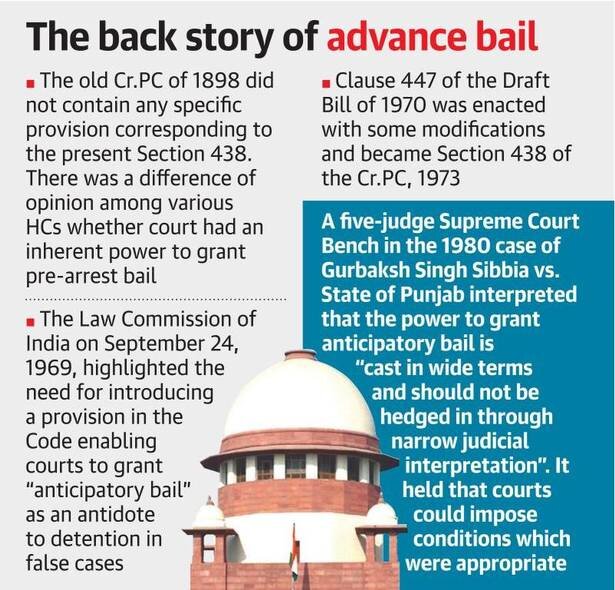Indian Polity
SC’s Judgement on Anticipatory Bail
- 30 Jan 2020
- 5 min read
Why in News
The Supreme Court has recently held that the protection of anticipatory or pre-arrest bail cannot be limited to any time frame or “fixed period”.
- The questions referred to the Constitution Bench were twofold:
- Whether the protection granted to a person under Section 438 of the Code of Criminal Procedure should be limited to a fixed period till the accused surrenders in court, and
- Whether the life of anticipatory bail should end when the accused is summoned by the court.
Anticipatory Bail
- Section 438 (anticipatory bail) of the Code of Criminal Procedure deals with direction for grant of bail to a person apprehending arrest.
- It states that when any person has reason to believe that he may be arrested on an accusation of having committed a non- bailable offence, he may apply to the High Court or the Court of Session for a direction under this section; and that Court may, if it thinks fit, direct that in the event of such arrest, he shall be released on bail.
- The high frequency of arbitrary and heavy-handed arrests to harass and humiliate citizens, and often at the interest of powerful individuals led to the enactment of Section 438.
Highlights of the Judgement
- Section 438 and its Importance
- Anticipatory bail helps thwart influential powers from implicating their rivals in false cases.
- It protects people from the humiliation of detention in jail for days.
- Anticipatory bail is all the more needed now because there is a drive of political rivalry and “this tendency is showing signs of steady increase”.
- Duration of Bail
- The life of an anticipatory bail order does not normally end at the time and stage when the accused is summoned by the court, or when charges are framed, but can continue till the end of the trial.
- A denial of bail amounts to deprivation of personal liberty (a fundamental right under Article 21 of the Constitution), thus, the Court should lean against the imposition of unnecessary restrictions on the scope of Section 438.
- Parliament has not thought it appropriate to curtail the power or discretion of the courts, in granting pre-arrest or anticipatory bail, especially regarding the duration, or till chargesheet is filed, or in serious crimes. Therefore, it would not be in the larger interests of society if the court, by judicial interpretation, limits the exercise of that power.
- Grant of Anticipatory Bail
- The court held that a plea for anticipatory bail can be filed even before the registration of FIR as long as there is reasonable basis for apprehension of arrest and clarity of facts.
- An application for anticipatory bail should be based on concrete facts and not vague or general allegations. The application should also contain bare essential facts relating to the offence and why the applicant reasonably apprehends arrest.
- The grant of protection should not be “blanket” but confined to specific offence or incident for which relief from arrest is sought. It is open for the police to move court for arrest of the accused if there is any violation of bail conditions.
- Conditions on Anticipatory Bail
- It is open for a court to impose appropriate conditions for grant of anticipatory bail if the specific facts or the features of the offence involved demands it.
- Restrictions/conditions can be imposed only on a case-to-case basis. Courts have to consider the nature of the offence, the role of the person, the likelihood of his influencing the course of investigation or tampering of evidence, including intimidating witnesses and fleeing justice.
- It is essential for the court to evaluate the threat or apprehension, its gravity or seriousness and the appropriateness of any condition that may have to be imposed. Special or other restrictive conditions may be imposed if the case or cases warrant, but should not be imposed in a routine manner in all cases.




